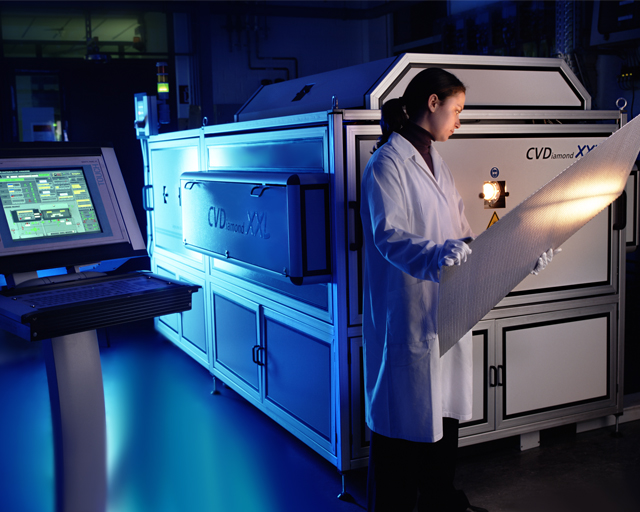
Ultra-hard optical diamond coatings

Transparent glasses with high scratch protection is needed in many industries today: from viewing panels for smartphones and watches to optical instruments and sensor systems to applications in medical technology. In a collaborative project with the Institute for Materials Research (IMO) of the Belgian University of Hasselt, the Fraunhofer IST is developing and researching ultra-hard optical diamond coatings. The aim of the project is to enable transparent and durable diamond coatings and coating systems for optical applications with high mechanical resistance and improved utility value.


Challenge and project goal
Transparent coatings with scratch protection often determine the usability and service life of optical components. If the dial of a wristwatch or the lens of an optical measuring system is scratched or clouded by abrasion, further use is often no longer possible. Transparent scratch protection or a combination of scratch protection and anti-reflective coating (AR coating) is already used in many industries, but existing coating solutions are reaching physical limitations. The demand for improved scratch protection and thus longer product lifetimes is constantly increasing.
Diamond offers excellent protection against abrasive influences due to its high hardness and mechanical resistance. Ultra-hard nanocrystalline and transparent diamond coatings show the potential to complement and extend existing coating solutions as scratch protection of optical applications. In addition, optical diamond coatings could be used in a complementary layer structure as an AR coating and thus increase the resistance of the coating system.
Solution
The novelty of the proposed solution to be investigated here is the deposition of very thin and smooth diamond layers with low absorption. High transmission is crucial for optical applications, as is the avoidance of stray light and reflections. For the development of ultra-hard anti-reflective coating systems, diamond coatings with precisely defined thicknesses are embedded in multilayer systems of low- or medium-refractive conventional coatings and tested therein.
The Fraunhofer IST uses hot filament chemical vapor deposition (HFCVD) for this purpose. The fully automated coating systems developed in-house allow coating areas of up to 1000 mm x 500 mm.
The coating processes for optical diamond coatings are being developed in the project in such a way that the economic production of very uniform coatings is possible. The selection and optimization of the base material, the substrate pre-treatment and the process design are essential focal points of the project.
The base bodies to be coated include various types of glass such as quartz glass, borosilicate glass, float glass and sapphire. In the research project, HFCVD diamond coating processes with reduced coating temperatures are being developed and researched in adaptation to these basic bodies, some of which are temperature-sensitive. The focus here is on optical properties such as absorption and scattering as well as mechanical resistance to abrasive loads.
Outlook
Transparent ultra-hard diamond coatings in AR coating systems should lead to abrasion-resistant surfaces. At the end of the project, findings on the wear resistance of the optical diamond coatings and diamond coating systems on various substrates will be available. The customer benefits resulting from the unsurpassed hardness and durability of diamond will thus be demonstrated for optical applications.

The project
The project is funded by the German Federal Ministry for Economic Affairs and Climate Action based on a resolution of the German Bundestag. Funding of the individual research project by the Industrielle Gemeinschaftsforschung (IGF project no.: 263 EN) from the German federal budget within the framework of a transnational CORNET overall project.
This article is part of the Annual Report 2021.


